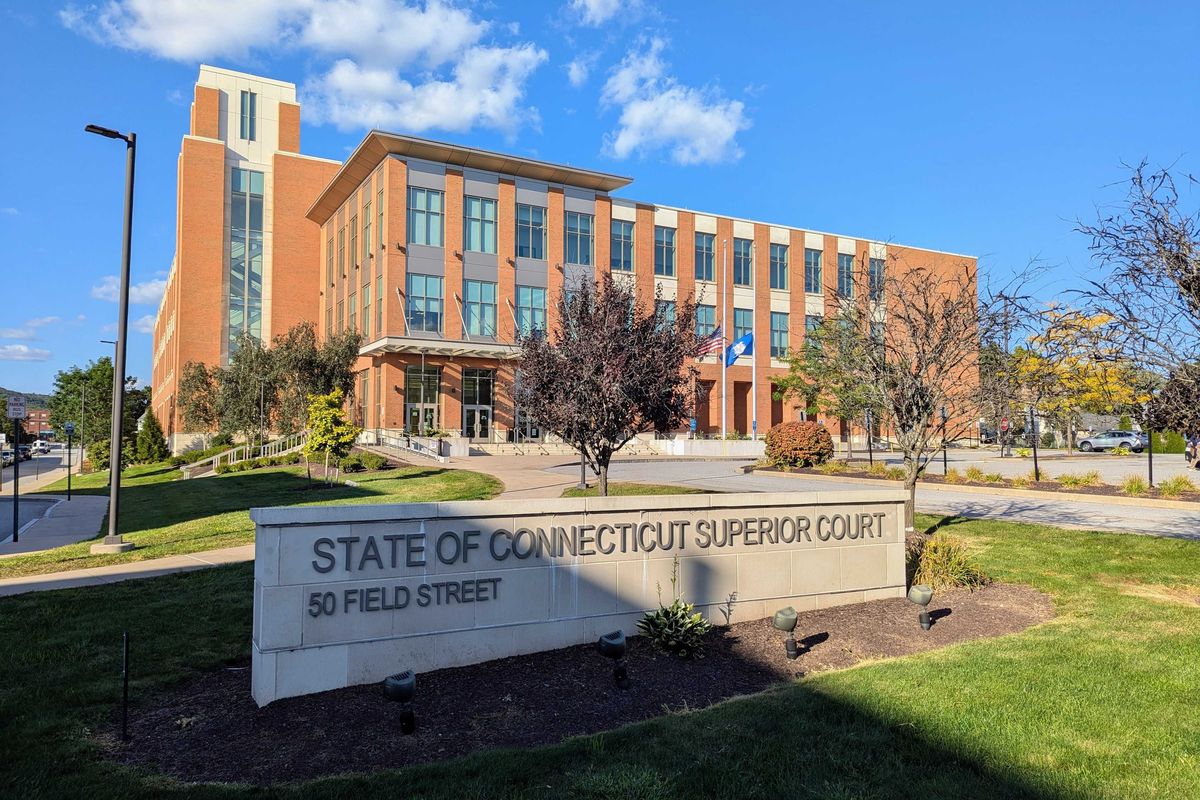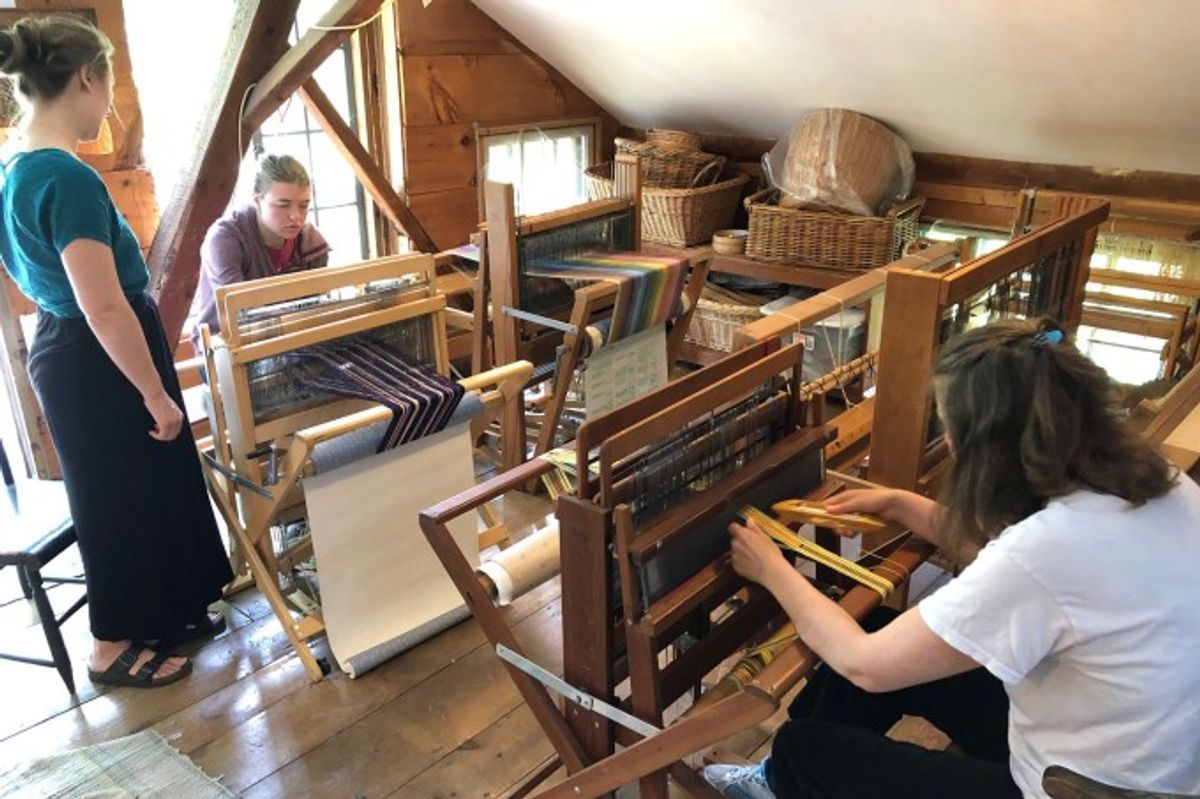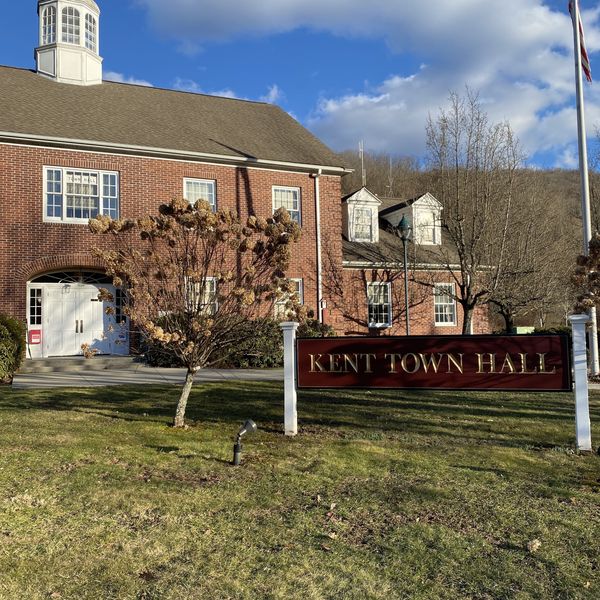Latest News
The case of Jacquier vs. Camardi is expected to continue at Torrington Superior Court the week of Sept. 15.
Photo by Riley Klein
NORTH CANAAN — A pair of Democratic Town Committee (DTC) candidates are seeking legal recourse to ensure they are included on the ballot this November despite errors on the party endorsement slate.
Plaintiffs Jean Jacquier and Carol Overby brought the case against defendant Marilisa Camardi to Torrington Superior Court, which held an evidentiary hearing Friday, Sept. 12. Testimony from both sides aimed to explain the situation to Judge Ann E. Lynch.
At the July 22 DTC caucus, Jacquier was endorsed as the party’s candidate for town clerk and Overby was endorsed to run for Board of Finance.
The next day, DTC chair and caucus secretary Chris Jacques filed the full endorsement slate and State Election Enforcement Commission (SEEC) documents to Assistant Town Clerk Marilisa Camardi. But the slate was missing information: Jacquier and Overby were not assigned to a specific office or term.
"I am a rookie at this," Jacques said on the witness stand. "I suppose I just didn't look at it closely enough."
Jacquier testified that she was not wearing her glasses while filling out her information on the official endorsement slate and “made a clerical mistake.”
Overby was not called as a witness.
Camardi testified to noticing on July 24 that the form was missing information and, after cross referencing the accompanying SEEC documents, filled in the blanks herself. It was established during the hearing that making clerical corrections on forms is within proper protocol for a town clerk.
On Aug. 7, however, First Selectman Brian Ohler alerted the Secretary of the State’s (SOTS) office that the original document was incomplete. (Ohler was not present at the Sept. 12 hearing.)
SOTS Election Officer Heather Augeri reviewed the slate as it was originally submitted. Per the filing, she responded that the endorsements were not properly certified and therefore void. Augeri advised Camardi remove both nominees from the ballot.
Jacquier testified that since the Aug. 7 correspondence she has had several phone calls with Augeri, who she described as a friend. Jacquier said Augeri relayed the same message to her: “She said it’s not valid.”
Camardi is the acting town clerk in North Canaan, though she is technically Jacquier’s part-time assistant. Jacquier is the current, four-term elected town clerk but has not reported to work since February following a dispute between her and the first selectman. “I did not resign. I did not quit. I just left,” Jacquier testified. “I couldn’t stand the turmoil.”
Plaintiff attorney John Kennelly said the SOTS office has no statutory authority to rule on issues relating to municipal party endorsements. Kennelly claimed that as the acting town clerk, Camardi is the sole individual responsible for finalizing and certifying the town election ballot.
Kennelly asserted that if Camardi was informed through the SEEC documents of which offices Jacquier and Overby were endorsed for, then Augeri’s advice should be ignored and the two candidates should be eligible to run in November.
Camardi said she was waiting to finalize the ballot until the court makes its decision.
After nearly three hours of testimony, Judge Lynch referenced a similar case, Airey vs. Feliciano (2024), in which Connecticut Supreme Court ruled to reject an improperly signed petition sheet. Lynch requested briefs from each attorney by Monday, Sept. 15, and planned to continue the hearing that week.
Keep ReadingShow less
Wake Robin public hearing closes
Sep 10, 2025
Aradev LLC’s plans to redevelop Wake Robin Inn include four 2,000-square-foot cabins, an event space, a sit-down restaurant and fast-casual counter, a spa, library, lounge, gym and seasonal pool. If approved, guest room numbers would increase from 38 to 57.
Provided
LAKEVILLE — The public hearing for the redevelopment of Wake Robin Inn is over. Salisbury Planning and Zoning Commission now has two months to make a decision.
The hearing closed on Tuesday, Sept. 9, after its seventh session.
Michael Klemens, chair of P&Z, had warned at the opening of the proceedings that “this might be a long night” due to a last-minute influx of material from experts hired by Wells Hill Road residents William and Angela Cruger to oppose the project, but this turned out not to be the case.
These 11th hour submissions set a sour tone to the start of the meeting, with commissioner Robert Riva stating that it was “not very professional to pull this stunt on this Commission.” Riva said he had diligently reviewed the already substantial documentation provided by both the applicant and the opposing experts, and was surprised to find a “dump” of additional information submitted just hours before the meeting’s start time at 6 p.m.
Tensions were quickly eased, however, when William Cruger offered his concise summation of his platform’s opposition to the expansion, which is the second iteration of the project after an earlier version was withdrawn late last year.
“It’s important for you all to hear from me that there was never any disrespect intended to the Commission, the commissioners, and to the process,” Cruger said. He defended the last-minute submissions as an effort on the part of the experts to be thorough in their analysis: “Our intention… has been and remains to do our best to get whatever we think will be helpful in your deliberations into the record.”
The Crugers formally entered the hearing process as intervenors for the first application from Aradev LLC, the applicant, in the fall of 2024, meaning they and their hired consultants had full party status in the hearing proceedings. During this cycle, however, they chose not to petition for intervenor status, yet during this round of hearings their role has been similar. Klemens described them as having “almost intervenor status — not quite.”
William Cruger summarized the consultant’s findings for Aradev’s revised application, noting they found it to be “virtually identical in scale to the previous proposal.”
“Our position is that the proposed expansion would absolutely negatively impact the usefulness, enjoyment and value of the surrounding properties,” he said.
Aradev’s attorney Joshua Mackey countered by saying that the special permit conditions would elevate the currently non-conforming hotel in the zone, describing it as a “community asset that is improved, regulated, and safeguarded for generations to come.” He characterized Aradev as “the next steward of this storied property.”
After Mackey and Aradev co-founder Steven Cohen concluded their remarks, Klemens closed the hearing with no public comment, which he had stated would be the case at last week’s hearing session on Thursday, Sept. 4. Klemens said that P&Z will begin deliberating the proposal in early October after the commissioners have had the chance to review the information in the record.
A total of 45 letters, including the Crugers’ experts’ testimony, were submitted since the Sept. 4 meeting alone, alongside hundreds of pages of application materials and additional testimony.
As the Commission deliberates and reviews, all of this information is available for public viewing on the “Meeting Documents” subpage under P&Z’s section on the town website, www.salisburyct.us.
The Commission must issue a decision on the application by Nov. 13, the end of the statutorily defined deliberation window.
Keep ReadingShow less
The Weavery is Stanton Home’s oldest activity space, featuring a collection of vintage and modern floor looms. It offers opportunities for building dexterity, creative expression, and social connection through fiber arts.
Provided
Stanton Home is holding its annual Harvest Roast fundraiser on Saturday, Sept. 13 in Great Barrington, an evening of farm-to-table dining, live swing music, and community connection.
For nearly 40 years, Stanton Home has supported adults with intellectual and developmental disabilities through residential programs, therapeutic services and skill-building activities.
“Here in the Berkshires, adults with diverse abilities often face barriers like limited housing, tricky transportation, and fewer opportunities for meaningful work,” said Executive Director Peter Stanton. “Stanton Home flips that script. Our mission is to partner with adults to pursue healthy, self-determined lives.”
The Harvest Roast features locally grilled meats, roasted vegetables from Stanton’s own gardens, warm apple crisp with SoCo Creamery ice cream, and beverages —all set to the swing and gypsy jazz rhythms of the Lucky 5 Band.
“The Harvest Roast is a celebration of what makes our community strong, inclusive, and vibrant,” Stanton said. “Every ticket and sponsored table supports programs that make a lasting difference.”
Guests will begin in the gardens with a signature cocktail before gathering at long farm tables for a shared meal and celebration.
“Though this night matters, the work is year-round,” Stanton added. “People can help by shopping locally at the farm store or buying handmade weavery goods, pitching in with time or skills, gardening, lending a hand at events or by partnering with Stanton’s programs like composting or sourcing local goods. Folks can also speak up for inclusion in their workplace or community circle. Even the smallest action helps keep the mission alive.”
Tickets are $125 per person. Proceeds support Stanton Home’s inclusive programs. Reserve at donorbox.org/events/771775/steps/choose_tickets or call 413-441-0761.
Keep ReadingShow less
Charles Busch wrote and stars in ‘Die Mommie Die!’ at Sharon Playhouse.
Provided
Following the memorable benefit reading last season of Charles Busch’s Tony-nominated Broadway hit, “The Tale of the Allergist’s Wife,” the Sharon Playhouse will present a one-night-only staged reading of his riotous comic melodrama “Die Mommie Die!” on Friday, Sept. 12 at 7 p.m.
The production —a deliciously over-the-top homage to classic Hollywood mid-century thrillers — continues the Playhouse’s artistic partnership with Busch, who reprises his iconic role of the glamorous yet troubled songstress Angela Arden.
The playwright and performer is no stranger to the Playhouse and, luckily, he’s supported by a truly stellar powerhouse cast of top-notch comic actors — some returning to the Playhouse stage, and some making their debut. The cast includes Richard Kind; two-time Tony Award nominee Kristine Nielsen, who was part of the original New York cast; Tony Award winner Celia Keenan-Bolger; Andrew Keenan-Bolger; and Claybourne Elder.
The production also marks a fortuitous alignment of talent and history. It is directed by Sharon Playhouse Artistic Director Carl Andress, who performed in the play’s Los Angeles premiere in 1999.
“I have a long and happy history with this particular show,” Andress said. “At the Sharon Playhouse, we’re thrilled to offer unforgettable, one-of-a-kind live experiences. With Charles Busch and this phenomenal cast, ‘Die Mommie Die!’ will surely light up the Olsen Stage with laughter, wit and glamour.”
The original music is by Lewis Flinn, whose score for the 2007 Off-Broadway production is being adapted specially for this event.
The play is a classic Charles Busch concoction that, like all his work, lovingly and intelligently spoofs some of the greatest talents and tropes of stage and screen. The original production was praised by critics as his “funniest, most accomplished and, without question, raunchiest work.”
In 2003, Busch won the Best Performance award at the Sundance Film Festival for the film version of “Die Mommie Die!” His indelible contributions to American theater have been recognized with countless awards and he was recently inducted into the Theater Hall of Fame.
The event promises to be an unforgettable night of laughter, glamour and theatrical fun, with all proceeds going to benefit Sharon Playhouse’s productions and educational programs. The funds will help ensure that the Playhouse continues to thrive as a cultural destination for audiences and artists alike.
For tickets, visit: sharonplayhouse.org. Running time: 90 minutes.
Richard Feiner and Annette Stover have worked and taught in the arts, communications, and philanthropy in West Berlin, Paris, Tokyo, and New York. Passionate supporters of the arts, they live in Salisbury and Greenwich Village.
Keep ReadingShow less
loading









